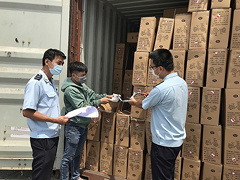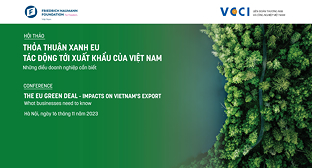Notices on checking origin of goods under free trade agreements
20/11/2020 12:00

Many notices checking origin of goods for southern Customs units in the implementation of free trade agreements.
On November 16, at the seminar "Training and disseminating regulations on origin of goods in free trade agreements" co-organised by the General Department of Vietnam Customs, speakers presented many notices on checking origin of goods for southern customs units in the implementation of trade agreements.
At the seminar, representatives of the Customs Control and Supervision Department of Customs; International Cooperation Department - Ministry of Finance, Expert of the USAID funded Trade Facilitation Project gave an overview of the rules of origin in free trade agreements in which Vietnam is a member; disseminate and train on international commitments about origin of goods in EVFTA Agreement, and incorporate into national law as specified in Circular 11/2020/TT-BCT dated June 15, 2020.
At the same time, customs officials were trained in origin verification and inspection procedures in free trade agreements in which Vietnam is a member; training on checking self-certification in CPTPP and EVFTA agreements.
At the seminar, the speakers presented a lot of notices about checking origin of goods for southern customs units in the implementation of trade agreements.
Regarding rules of origin, a representative of the Customs Control and Supervision Department - General Department of Vietnam Customs noted that for the pure origin, the goods are produced entirely at the exporting party and produced by raw materials originating entirely from the export country. Any non-originating ingredients/materials added during the manufacturing process, goods would be excluded from the category of "pure origin goods".
Goods in this section are natural products or produced from natural products; if any ingredient or non-originating material is added in the manufacturing process, it would be excluded from the group of "pure origin goods".
Materials with origin must meet specified origin criteria and be used in the production of the goods.
For non-originating materials, essentially, it does not meet specified origin criteria. That raw material or ingredient is imported from a non-member country or the material is produced in an FTA but it does not meet the origin criteria.
Regarding checking certificate of origin, a representative of the Customs Control and Supervision Department - General Department of Vietnam Customs said in case of submitting proof of origin, including goods subject to special preferential tariff rates; goods subject to import management; goods, which are notified by Vietnam or international organisations, are posing a risk of harming social safety, public health or environmental sanitation, it should be controlled. This includes goods imported from countries subject to applying anti-dumping tax, anti-subsidy tax, safeguard measures, tariff quota measures and quantity restriction measures announced by Vietnam.
There are some exceptions relating to time of submission and declaring on the customs declaration, that are the case of change in the commodity code: customs declarant is allowed to submit additional proof of origin within the valid period of the proof of origin in order to be considered for the application of special preferential tariff rates.
During discussion, the local customs units shared their experiences on checking and determining origin of exported and imported goods.
On November 16, at the seminar "Training and disseminating regulations on origin of goods in free trade agreements" co-organised by the General Department of Vietnam Customs, speakers presented many notices on checking origin of goods for southern customs units in the implementation of trade agreements.
At the seminar, representatives of the Customs Control and Supervision Department of Customs; International Cooperation Department - Ministry of Finance, Expert of the USAID funded Trade Facilitation Project gave an overview of the rules of origin in free trade agreements in which Vietnam is a member; disseminate and train on international commitments about origin of goods in EVFTA Agreement, and incorporate into national law as specified in Circular 11/2020/TT-BCT dated June 15, 2020.
At the same time, customs officials were trained in origin verification and inspection procedures in free trade agreements in which Vietnam is a member; training on checking self-certification in CPTPP and EVFTA agreements.
At the seminar, the speakers presented a lot of notices about checking origin of goods for southern customs units in the implementation of trade agreements.
Regarding rules of origin, a representative of the Customs Control and Supervision Department - General Department of Vietnam Customs noted that for the pure origin, the goods are produced entirely at the exporting party and produced by raw materials originating entirely from the export country. Any non-originating ingredients/materials added during the manufacturing process, goods would be excluded from the category of "pure origin goods".
Goods in this section are natural products or produced from natural products; if any ingredient or non-originating material is added in the manufacturing process, it would be excluded from the group of "pure origin goods".
Materials with origin must meet specified origin criteria and be used in the production of the goods.
For non-originating materials, essentially, it does not meet specified origin criteria. That raw material or ingredient is imported from a non-member country or the material is produced in an FTA but it does not meet the origin criteria.
Regarding checking certificate of origin, a representative of the Customs Control and Supervision Department - General Department of Vietnam Customs said in case of submitting proof of origin, including goods subject to special preferential tariff rates; goods subject to import management; goods, which are notified by Vietnam or international organisations, are posing a risk of harming social safety, public health or environmental sanitation, it should be controlled. This includes goods imported from countries subject to applying anti-dumping tax, anti-subsidy tax, safeguard measures, tariff quota measures and quantity restriction measures announced by Vietnam.
There are some exceptions relating to time of submission and declaring on the customs declaration, that are the case of change in the commodity code: customs declarant is allowed to submit additional proof of origin within the valid period of the proof of origin in order to be considered for the application of special preferential tariff rates.
During discussion, the local customs units shared their experiences on checking and determining origin of exported and imported goods.
Source: Customs News
Các tin khác
- Textile and garment exports recovered positively (19/04/2024)
- Foreign steel imported en masse, manufacturers call for protection (19/04/2024)
- US targets Chinese steel with 'overcapacity' fallacy amid escalating trade tensions; move casts great uncertainty on stabilizing bilateral ties (19/04/2024)
- Thailand is considering implementing protective tariffs on imports from China (19/04/2024)
- Fruit and vegetable exports to RoK and Thailand surge (19/04/2024)
 Home
Home
 About Us
About Us




















